

Commentary Select
Commentary Select




Matthew 1-13: Ancient Christian Commentary on Scripture (ACCS)
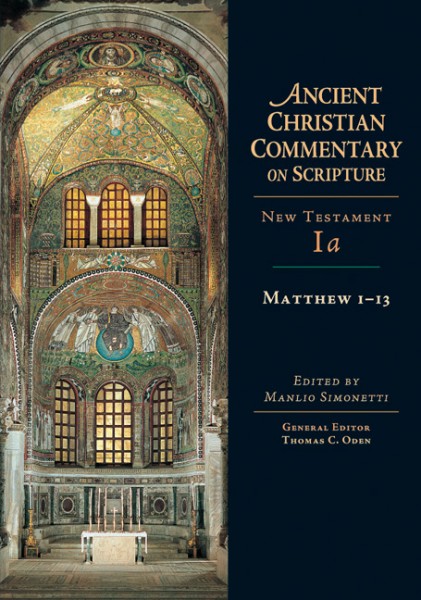
Matthew 1-13: Ancient Christian Commentary on Scripture (ACCS)
The Ancient Christian Commentary on Scripture does what very few of today's students of the Bible could do for themselves. With the aid of computer technology, the vast array of writings from the church fathers—including much that is available only in the ancient languages—have been combed for their comment on Scripture. From these results, scholars with a deep knowledge of the fathers and a heart for the church have hand-selected material for each volume, shaping, annotating and introducing it to today's readers. Each portion of commentary has been chosen for its salient insight, its rhetorical power and its faithful representation of the consensual exegesis of the early church.
The Ancient Christian Commentary on Scripture is an ecumenical project, promoting a vital link of communication between the varied Christian traditions of today and their common ancient ancestors in the faith. On this shared ground, we listen as leading pastoral theologians of seven centuries gather around the text of Scripture and offer their best theological, spiritual and pastoral insights.
Today the historical-critical method of interpretation has nearly exhausted its claim on the biblical text and on the church. In its wake there is a widespread yearning among Christian individuals and communities for the wholesome, the deep and the enduring. The Ancient Christian Commentary on Scripture does not seek to replace those excellent commentaries that have been produced in the twentieth century. Rather, it supplements them, framing them with interpretive voices that have long sustained the church and only recently have fallen silent. It invites us to listen with appreciative ears and sympathetic minds as our ancient ancestors in the faith describe and interpret the scriptural vistas as they see them.
The Ancient Christian Commentary on Scripture is a postcritical revival of the early commentary tradition known as the glossa ordinaria, a text artfully elaborated with ancient and authoritative reflections and insights. An uncommon companion for theological interpretation, spiritual reading, and wholesome teaching and preaching.
About the Matthew 1-13 volume:
The Gospel of Matthew stands out as a favorite biblical text among patristic commentators. The patristic commentary tradition on Matthew begins with Origen's pioneering twenty-five-volume commentary on the First Gospel in the mid-third century. In the Latin-speaking West, where commentaries did not appear until about a century later, the first commentary on Matthew was written by Hilary of Poitiers in the mid-fourth century.
From that point, the First Gospel became one of the texts most frequently commented on in patristic exegesis. Outstanding examples are Jerome's four-volume commentary and the valuable but anonymous and incomplete Opus imperfectum in Matthaeum. Then there are the Greek catena fragments derived from commentaries by Theodore of Heraclea, Apollinaris of Laodicea, Theodore of Mopsuestia and Cyril of Alexandria.
The ancient homilies also provide ample comment, including John Chrysostom's ninety homilies and Chromatius of Aquileia's fifty-nine homilies on the Gospel of Matthew. In addition, there are various Sunday and feast-day homilies from towering figures such as Augustine and Gregory the Great, as well as other fathers.
This rich abundance of patristic comment, much of it presented here in English translation for the first time by editor Manlio Simonetti, provides a bountiful and varied feast of ancient interpretation of the First Gospel.
Matthew 14-28: Ancient Christian Commentary on Scripture (ACCS)
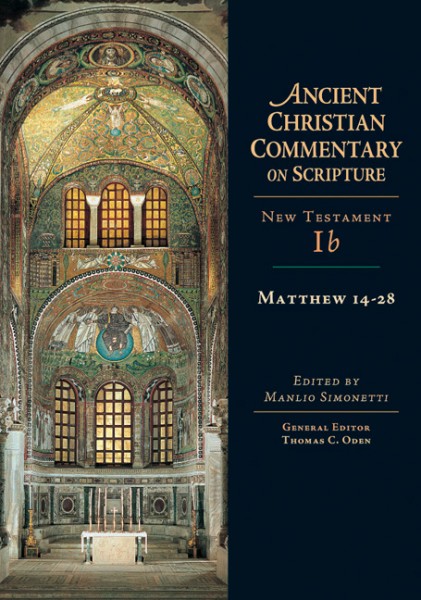
Matthew 14-28: Ancient Christian Commentary on Scripture (ACCS)
The Ancient Christian Commentary on Scripture does what very few of today's students of the Bible could do for themselves. With the aid of computer technology, the vast array of writings from the church fathers—including much that is available only in the ancient languages—have been combed for their comment on Scripture. From these results, scholars with a deep knowledge of the fathers and a heart for the church have hand-selected material for each volume, shaping, annotating and introducing it to today's readers. Each portion of commentary has been chosen for its salient insight, its rhetorical power and its faithful representation of the consensual exegesis of the early church.
The Ancient Christian Commentary on Scripture is an ecumenical project, promoting a vital link of communication between the varied Christian traditions of today and their common ancient ancestors in the faith. On this shared ground, we listen as leading pastoral theologians of seven centuries gather around the text of Scripture and offer their best theological, spiritual and pastoral insights.
Today the historical-critical method of interpretation has nearly exhausted its claim on the biblical text and on the church. In its wake there is a widespread yearning among Christian individuals and communities for the wholesome, the deep and the enduring. The Ancient Christian Commentary on Scripture does not seek to replace those excellent commentaries that have been produced in the twentieth century. Rather, it supplements them, framing them with interpretive voices that have long sustained the church and only recently have fallen silent. It invites us to listen with appreciative ears and sympathetic minds as our ancient ancestors in the faith describe and interpret the scriptural vistas as they see them.
The Ancient Christian Commentary on Scripture is a postcritical revival of the early commentary tradition known as the glossa ordinaria, a text artfully elaborated with ancient and authoritative reflections and insights. An uncommon companion for theological interpretation, spiritual reading, and wholesome teaching and preaching.
About the Matthew 14-28 volume:
The Gospel of Matthew stands out as a favorite biblical text among patristic commentators. The patristic commentary tradition on Matthew begins with Origen's pioneering twenty-five-volume commentary on the First Gospel in the mid-third century. In the Latin-speaking West, where commentaries did not appear until about a century later, the first commentary on Matthew was written by Hilary of Poitiers in the mid-fourth century.
From that point the First Gospel became one of the texts most frequently commented on in patristic exegesis. Outstanding examples are Jerome's four-volume commentary and the valuable but anonymous and incomplete Opus imperfectum in Matthaeum. Then there are the Greek catena fragments derived from commentaries by Theodore of Heraclea, Apollinaris of Laodicea, Theodore of Mopsuestia and Cyril of Alexandria.
The ancient homilies also provide ample comment, including John Chrysostom's ninety homilies and Chromatius of Aquileia's fifty-nine homilies on the Gospel of Matthew. In addition, there are various Sunday and feast-day homilies from towering figures such as Augustine and Gregory the Great, as well as other fathers.
This rich abundance of patristic comment, much of it presented here in English translation for the first time by editor Manlio Simonetti, provides a bountiful and varied feast of ancient interpretation of the First Gospel.
Matthew 16:13-28:20 (Preacher's Outline & Sermon Bible Series)

Matthew 16:13-28:20 (Preacher's Outline & Sermon Bible Series)
The Preacher’s Outline & Sermon Bible® (POSB) is a practical and comprehensive commentary set that gives the pastor or teacher everything they need to preach or teach God’s Word. Covering every book of the Bible, POSB is the perfect resource for expository or topical teaching.
With over a million copies sold in print, POSB is unlike any other commentary you will encounter. Each volume gives you detailed, verse-by-verse exposition for every Bible passage. Along with the biblical commentary, POSB includes extensive outlines with sub-points, thoughts on practical application, deeper studies on key biblical topics and themes, and full cross references.
You will quickly see the added value and ease of use that comes with having this commentary in your Olive Tree library. The Olive Tree edition separates the outlines and commentary to make POSB even easier to use. Instead of scrolling back and forth (or flipping pages), you can see the commentary and outlines side-by-side as you study or prepare your sermon. POSB is also fully functional with the Resource Guide and is configured to help you get to the information you need quickly. You can both drill down to the verse you want to study and easily find all the introductory material on each book of the Bible.
The Preacher’s Outline and Sermon Bible makes it easy to create life-changing sermons and lessons. Everything you need to understand any passage of the Bible is right at your fingertips. And this resource is not just for preachers and teachers; it’s perfect for any Christian who wants to know God’s Word better.
POSB features include:
- Detailed outlines for every book of the Bible
- Well researched and easy to read commentary
- Practical application for godly living
- Deeper studies to dive into key topics and themes
- Full text cross references (no need to look them up)
Matthew 1:1-16:12 (Preacher's Outline and Sermon Bible Series)

Matthew 1:1-16:12 (Preacher's Outline and Sermon Bible Series)
The Preacher’s Outline & Sermon Bible® (POSB) is a practical and comprehensive commentary set that gives the pastor or teacher everything they need to preach or teach God’s Word. Covering every book of the Bible, POSB is the perfect resource for expository or topical teaching.
With over a million copies sold in print, POSB is unlike any other commentary you will encounter. Each volume gives you detailed, verse-by-verse exposition for every Bible passage. Along with the biblical commentary, POSB includes extensive outlines with sub-points, thoughts on practical application, deeper studies on key biblical topics and themes, and full cross references.
You will quickly see the added value and ease of use that comes with having this commentary in your Olive Tree library. The Olive Tree edition separates the outlines and commentary to make POSB even easier to use. Instead of scrolling back and forth (or flipping pages), you can see the commentary and outlines side-by-side as you study or prepare your sermon. POSB is also fully functional with the Resource Guide and is configured to help you get to the information you need quickly. You can both drill down to the verse you want to study and easily find all the introductory material on each book of the Bible.
The Preacher’s Outline and Sermon Bible makes it easy to create life-changing sermons and lessons. Everything you need to understand any passage of the Bible is right at your fingertips. And this resource is not just for preachers and teachers; it’s perfect for any Christian who wants to know God’s Word better.
POSB features include:
- Detailed outlines for every book of the Bible
- Well researched and easy to read commentary
- Practical application for godly living
- Deeper studies to dive into key topics and themes
- Full text cross references (no need to look them up)
Matthew, Mark: Cornerstone Biblical Commentary

Matthew, Mark: Cornerstone Biblical Commentary
David L. Turner, PhD, is a graduate of Cedarville University, Grace Theological Seminary (ThD), and Hebrew Union College—Jewish Institute of Religion, Cincinnati (MPhil, PhD candidate). He has been professor of New Testament at Grand Rapids Theological Seminary since 1986 and has previously published several articles on the Gospel of Matthew.
Darrel L. Bock, PhD (University of Aberdeen), is research professor of New Testament Studies at Dallas Theological Seminary. His special fields of study include the use of the Old Testament in the New Testament, Luke—Acts, the historical Jesus, and the integration of theology and culture. Among his most recent publications are Breaking the Da Vinci Code (New York Times best-seller, May 2004), and a two-volume commentary on Luke (Baker).
Matthew: Bible Speaks Today (BST)
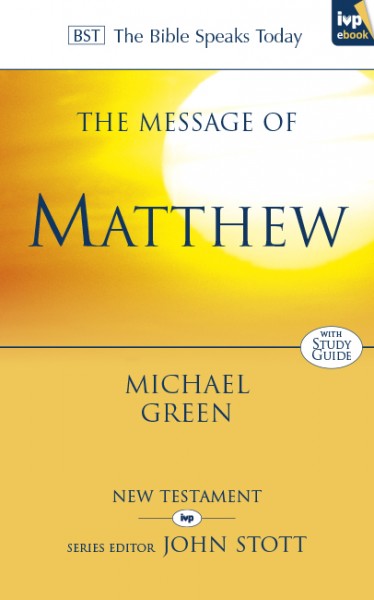
Matthew: Bible Speaks Today (BST)
The Gospel according to Matthew is perhaps the most important single document of the New Testament, for in it we have the fullest and most systematic account of the birth, life, teaching, death and resurrection of the founder of Christianity, Jesus the Messiah. In The Message of Matthew, Michael Green shows how this very Jewish Gospel portrays the power and purpose of Jesus' life and work, which was to bring light to all nations. Matthew records Jesus as Son of God, Messiah, Son of David, Son of Man and supremely as God returning to Jerusalem as judge and redeemer. The consequences of this steady focus are as relevant now as then. We need Matthew's emphasis on the unity of God's revelation, old and new, its reaching on the life of discipleship and the meaning of the kingdom of heaven, and its insights into the people of the messiah, the end of the world and the universality of the Good News.
About the Bible Speaks Today (BST) Series:
Edited by J.A. Motyer and the late John R. W. Stott, the Bible Speaks Today commentaries are characterized by what Stott called a "threefold ideal . . . to expound the biblical text with accuracy, to relate it to contemporary life and to be readable." As such, each contributor in this series is both a noted scholar and a working pastor.
The BST series, now complete, covers all sixty-six books of the bible (Old and New Testaments) in fifty-five volumes. If you preach or teach from Scripture, the Bible Speaks Today series will help you apply the timeless biblical message to the everyday experiences of your listeners. And if you study the Bible on your own, these volumes will be a helpful resource focusing on the significance of God's Word for your own life and work.
Matthew: New International Greek Testament Commentary Series (NIGTC)

Matthew: New International Greek Testament Commentary Series (NIGTC)
The fruit of nearly a decade worth of scholarship, research, and writing, this essential commentary on the Gospel of Matthew represents a new standard in commentaries on the Greek text.
Author John Nolland delves into the narrative techniques and methodology of Matthew's account of the life of Jesus. His approach draws stronger distinctions between it and Mark's account of the same events, and draws the reader closer into the narrative and style of the author of Matthew's Gospel, rejuvenating the reader's love for the primary Gospel of church history.
Reviews
Theological Book Review
"Although some may be daunted, or perhaps even wearied, by the appearance of another massive work on the Gospel of Matthew, readers will be pleasantly surprised that Nolland manages to balance exegetical detail with theological perspective which has resulted in a usable and well documented commentary."
Mentor Commentary: 1 & 2 Chronicles (MOT)
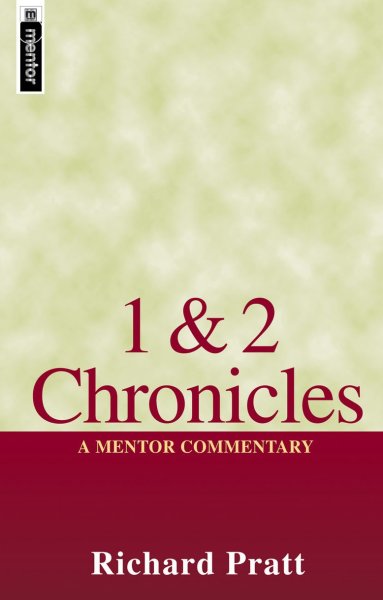
Mentor Commentary: 1 & 2 Chronicles (MOT)
To grasp the significance of Chronicles for our times, we must first understand its original meaning. It was written to encourage the Jews to be faithful to God (and not focus on material prosperity) on their return from Babylon. Pratt looks skillfully at the big picture in each section and presents the detail in an absorbing way.
The Mentor commentary series maintains a conservative theological tradition while interacting with modern theologians from other backgrounds.
Reviews
"Richard Pratt's exemplary commentary is systematic, scholarly, sober and simple...Professor Pratt's style is simple and clear...he sketches the complicated lineage of the high priesthood...so clearly that any reader can discern at a glance the lay of the land." — Bruce Waltke, Professor of Old Testament, Emeritus, Reformed Theological Seminary, Orlando, FloridaRichard L. Pratt is the president of Third Millennium Ministries. He is adjunct professor of Old Testament at Reformed Theological Seminary, and a visiting professor at Covenant Theological Seminary. He is an ordained minister in the Presbyterian Church in America, and travels extensively to evangelize and teach.
Mentor Commentary: Amos (MOT)
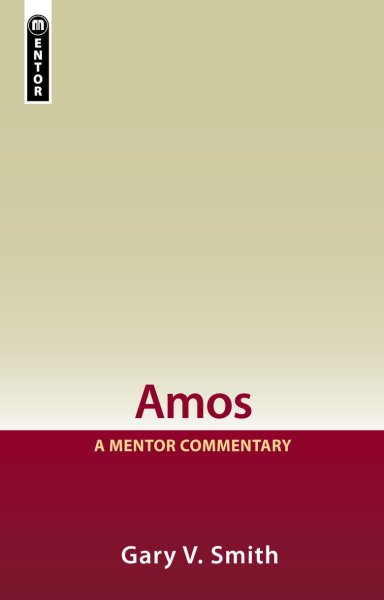
Mentor Commentary: Amos (MOT)
Mentor commentaries retain a high view of scripture while interacting with other research from differing theological viewpoints.
Reviews
"... written with depth to please the scholar and a breadth of application to suit the needs of the preaching pastor. This is a readable yet insightful volume, full of sound scholarship and clear writing." — ThemeliosGary V. Smith taught at Union University, Jackson, Tennessee and Midwestern Baptist Theological Seminary, Kansas City, Missouri.
Mentor Commentary: Ecclesiastes (MOT)
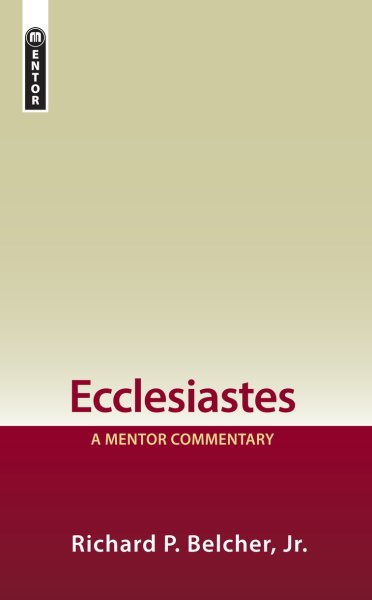
Mentor Commentary: Ecclesiastes (MOT)
Reviews
"Richard P. Belcher has given us a commentary that is thoroughly researched, balanced, and sensitive to the needs of preaching pastors. Whether it is read by students seeking to grasp what are the issues in Ecclesiastes (and what contemporary scholars are saying about those issues), or read by ministers and teachers preparing to preach and teach the book, it will prove to be immensely beneficial." — Duane A. Garrett, John R. Sampey Professor of Old Testament Interpretation at Southern Baptist Theological Seminary, Louisville, KentuckyRichard P. Belcher, Jr. is the John D. and Frances M. Gwin Professor of Old Testament and the Academic Dean at Reformed Theological Seminary Charlotte. He is also an ordained minister in the PCA and pastored an urban nondenominational church in Rochester, New York for ten years.
Mentor Commentary: Ezra & Nehemiah (MOT)
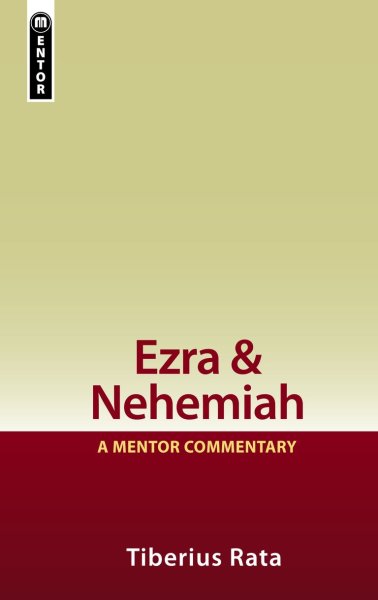
Mentor Commentary: Ezra & Nehemiah (MOT)
Reviews
"Tiberius Rata combines exegetical skill, knowledge of the ancient world, and a pastor's heart in this volume. His explanations of the text are clear, forceful, yet concise. This work will assist the church in understanding its call to godly service to Christ and will motivate its readers to re-consecrate their lives and possessions to the work of the Kingdom." — Kenneth A. Matthews, Professor of Divinity, Beeson Divinity School, Birmingham, Alabama"Reasoned, researched, and concise, Rata's commentary on Ezra and Nehemiah opens a window on the historical setting for these significant books of the Old Testament. Carefully selected photographs, illustrations, and charts punctuate its pages and illuminate the text's background, literary context, and interpretation. This volume ably addresses the interests of laymen and pastors alike as they study the biblical text of the two books." — William D. Barrick, Professor of Old Testament; The Master?s Seminary, Sun Valley, California
"Tiberius Rata has provided the church with a clearly written, insightful synthesis of the often-neglected books of Ezra and Nehemiah. The author's style is concise and readable; he stays on track and refuses to deviate from his primary goal of illuminating the meaning and significance of the biblical text. One of the most useful features of this volume is its attention to contemporary relevance. Without violating the meaning of the ancient text in its context, the author derives helpful practical insights that are consistent with its original intention." — Robert B. Chisholm, Jr., Chair and Professor of Old Testament Studies, Dallas Theological Seminary, Dallas, Texas
"Tiberius Rata's work on Ezra-Nehemiah should be warmly received by pastors and teachers. His commentary is clear and to the point, yet he discusses some problems at length, furnishing thoughtfulness and insight for solutions. His viewpoint is solidly orthodox and reverent. His high view of Scripture and of the God of Scripture is reflected throughout the work. His work demonstrates competent scholarship and conveys a pastor's heart-the work of a pastor scholar. His outlines and comments are helpful for understanding the flow ofthe historical narrative and are suggestive for sermon preparation. He provides useful summaries-for example, summaries for the chronology of the book-for understanding the book within the Old Testament canon and timeframe. His use of Ancient Near Eastern sources and documents also give historical context for the books of Ezra-Nehemiah. I recommend this work for teachers in colleges and seminaries and also for teachers and pastors in the local church." — Russell Fuller, Professor of Old Testament Interpretation, The Southern Baptist Theological Seminary, Louisville, Kentucky
A native of Romania, Tiberius Rata is the chair of the Biblical Studies Department and professor of Old Testament Studies at Grace College and Theological Seminary, Winona Lake, Indiana. He is a member of the Evangelical Theological Society and the Institute for Biblical Research and has presented papers at the national conventions of the Evangelical Theological Society. He is married to Carmen and they have two sons.
Mentor Commentary: Galatians (MNT)
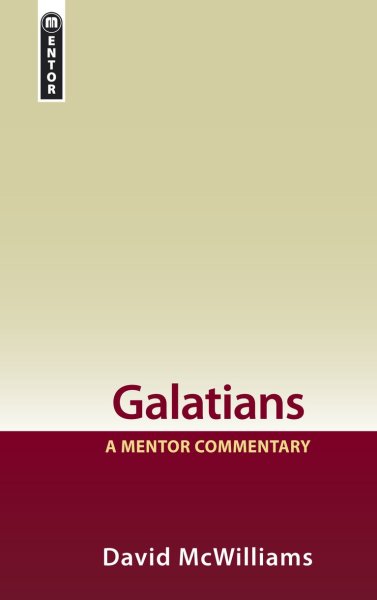
Mentor Commentary: Galatians (MNT)
Written principally, though not exclusively, as an aid to preachers, Galatians is an exposition that is scholarly yet readable, combining the rare qualities of depth and brevity. Galatians is sent out to the reading public with the prayer that it might be used of God to extend the gospel of Jesus Christ, and the truth of justifying righteousness through the proclamation of free grace to sinners who need the message of salvation through Christ alone!
Mentor commentaries combine a high view of scripture with access to the latest academic theological research. This unique combination allows the reader to see what recent scholarly research has discovered without losing sight of the inerrancy of scripture.
Reviews
"Pastor-Theologian David McWilliams has produced a preacher's commentary on Paul's epistle to the Galatians, that momentous announcement of the good news of righteousness and freedom in Christ alone, by grace alone, through faith alone. Dr. McWilliams addresses interpretive issues with clarity and cogent discernment, and he engages recent misperceptions of Paul's central concern—which is not merely sociological or ecclesiastical, but soteriological (How may guilty sinners be reconciled to their holy Creator?)—all the while keeping in view the aim of preaching this good news of sovereign grace. The author's fresh translation of Galatians enables readers to experience the fervor of the apostle's passionate alarm for his spiritual children in Galatia as they flirted with eternal ruin, and the comment that supports the translation demonstrates that the issues addressed in Galatians are not matters for aloof theological conversation, but matters of life and death. I highly recommend this resource to my fellow-preachers of the good news of God's Son." — Dennis E. Johnson, Professor of Practical Theology, Westminster Seminary in California, Escondido, California"Timely, lucid, and reliable, this is an excellent commentary for preachers, Bible study leaders and others. David McWilliams admirably succeeds in his aim for brevitas and claritas, the two qualities in commentators that Calvin most commended. He distils a great deal of scholarship into uncluttered and readable prose. Paul's message in Galatians has rarely been so urgently needed as today, when justification only by faith is under attack from many sides. McWilliams explains it with judicious care." — Robert Letham, Wales Evangelical School of Theology, Bridgend, Wales
David McWilliams has been the senior pastor at Covenant Presbyterian Church, Lakeland, Florida for 20 years. He has a passion for Christ-centred preaching and wished to apply the theology of the life of the church.
Mentor Commentary: Joel & Obadiah (MOT)
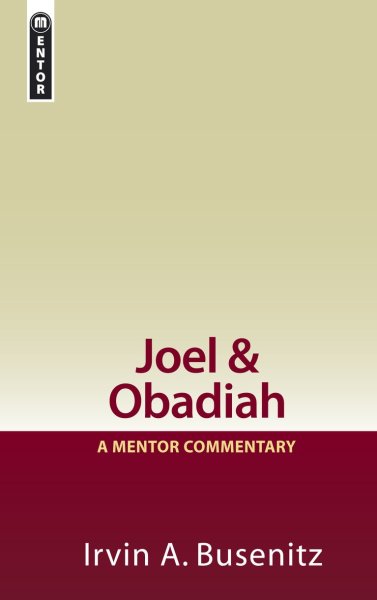
Mentor Commentary: Joel & Obadiah (MOT)
The people were facing devastating calamity and Joel calls the society to repent in order that they might escape this judgment and once again enjoy mercy and favour of Yahweh. Obadiah also focuses on the dual aspects of the theme: both that there is judgement and there is blessing.
Mentor commentaries retain a high view of scripture while interacting with other research from differing theological viewpoints.
Reviews
"... it is colourful, brief, thought-provoking, and useful as an overview, or as a companion to a study in greater depth." — Banner of Truth"This is a fine commentary, exhibiting careful and balanced Old Testament scholarship expressed in attractive, vigorous prose. I did not find a sentence that was not clear: Controversial issues affecting interpretation are well handled, for example the question as to whether the locusts in Joel 2 are literal or picture an invading army. The author argues well for an early date for Joel while recognising the complexity of the issue and presenting contrary viewpoints clearly and fairly." Geoffrey Grogan — (1925-2011), Principal of Glasgow Bible College and well-respected author
Irvin Busenitz was a member of Faculty at Talbot Theological Seminary before becoming a founding member of The Master's Seminary where he has taught ever since. Dr Busenitz was presented the John Solomon Award for excellence in Semitics and Old Testament, has done post-doctoral study at the American Institute of Holy Land Studies, has published journal and periodical articles, and is active in his local church and in Biblical conference ministries.
Mentor Commentary: Leviticus (MOT)
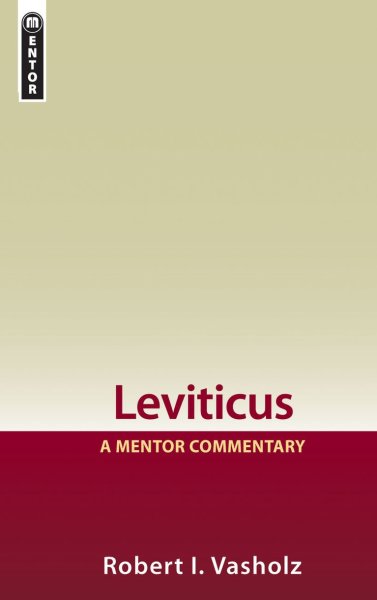
Mentor Commentary: Leviticus (MOT)
Sadly, it appears, the book of Leviticus has been retired to a secondary status in the Church today. Christians have largely relegated the punctilious details about such things as sacrifices and purity laws to a bygone era. There is of course some good reason for that. While rabbinic commentary teaches that this is the first book of Scripture that children should learn (age 5), modern readers often view Leviticus as tedious and dull. Reading Leviticus was, in the words of a third century church scholar, like having to eat unfit food.
The practices in Leviticus may seem distant and mysterious to the modern western world yet there are fundamental elements in the book of Leviticus that are both universal and relevant to the contemporary scene. What Christian would say that love your neighbor as yourself, the second greatest commandment, should be relegated to the past? One the most oft-cited verses in the New Testament Scripture is a command that first appears in the book of Leviticus. But it doesn’t stop there. Hebrews particularly expounds on Leviticus; it is close to impossible to comprehend parts of Hebrews without reference to Leviticus. This can be said with regard to passages in the gospel as well.
Reviews
"Dr Vasholz claims that Leviticus, far from being a book to avoid or skip over, is of basic importance to the Bible and to our understanding of what it teaches. His commentary proves the claim to the hilt. It is a high treat to enter into huge scholarship wedded to patient, detailed explanation and exposition of the sacred text. Here is Leviticus brought out of obscurity into the light, off the sidelines into the mainstream. The patience of his scholarship calls for patience in our reading, and rewards it." — Alec Motyer (1924–2016), well known Bible expositor and commentary writer"Vasholz's commentary on Leviticus provides another helpful resource for students of the Scriptures. His work on this often-neglected biblical book will take its place next to a comparatively small group of commentaries that combine an evangelical focus, a high view of Scripture, careful attention to the text, and an avoidance of overemphasis on symbolism and typology. Throughout the volume, he interacts with other commentaries on Leviticus as well as various monographs, writes clearly in an expositional fashion, and provides helpful explanations of a book whose meaning and importance eludes many of its readers." — Michael A. Grisanti, Professor of Old Testament, The Master's Seminary, Sun Valley, California
Robert I. Vasholz is Professor Emeritus of Old Testament at Covenant Theological Seminary in St Louis, Missouri. Though Dr. Valshoz retired in 2007, he continues to serve God?s people through his teaching, preaching and publishing projects.
Mentor Commentary: Matthew Chapters 1-13 (MNT)
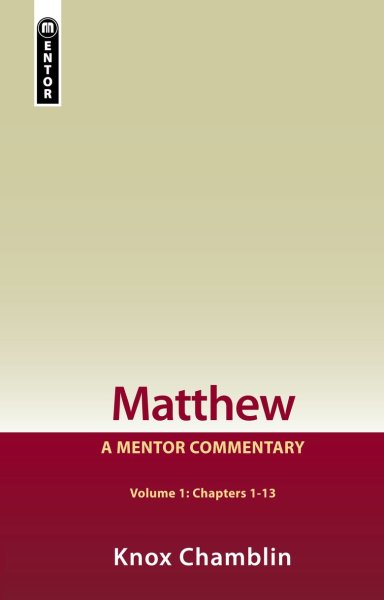
Mentor Commentary: Matthew Chapters 1-13 (MNT)
What sort of book is it? Who is its author, and why did he write it? What historical, literary and theological contexts influence it? Matthew's Gospel also tells a story of Jesus, the son of David the son of Abraham - accordingly it gives attention to characters, plot lines, conflicts and resolution - but the extra dimension is that it also has an effect upon its reader to direct them to the Savior of the world.
Reviews
"My head hurts when I think of how Knox Chamblin weighed and worried over every Greek word or phrase in every sentence of Matthew's Gospel and then has pulled it all together into a lucid and connected whole. And my heart is grateful for a commentary like this--that is thorough (he simply 'milks' the text), clear (both in its organization and in his positions), and 'pushy' (in driving us to worship). Chamblin clearly wants me to understand Matthew and to stand amazed in the presence of Jesus the Nazarene. Knox Chamblin is in vintage form here: relentlessly nailing us to the text and always wobbling on the edge of doxology." Dale Ralph Davis, Minister in Residence, First Presbyterian Church, Columbia, South Carolina"This thoughtful and thorough commentary on the First Gospel comes from a scholar who has obviously spent many years at the feet of Matthew the teacher, and even more importantly, at the feet of the One to whom Matthew bears witness." — Jonathan T. Pennington, Associate Professor of New Testament Interpretation, The Southern Baptist Theological Seminary, Louisville, Kentucky
Knox Chamblin (1935-2012) was ordained to the gospel ministry in 1971. He did graduate work at Cambridge University, and received his Th.D. from Union Theological Seminary in Virginia in 1977. He taught for thirty-four years in Jackson, Mississippi, first at Belhaven College, then at Reformed Theological Seminary until retirement in 2001.
Mentor Commentary: Matthew Chapters 14-28 (MNT)
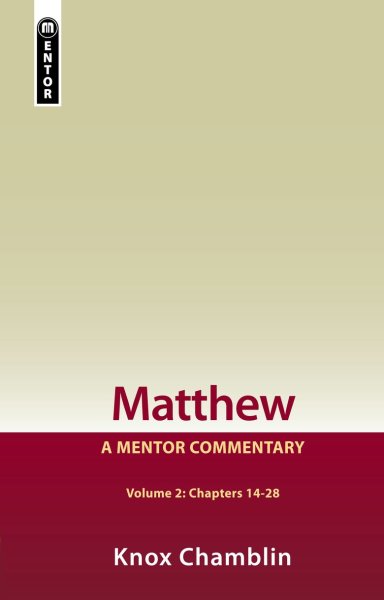
Mentor Commentary: Matthew Chapters 14-28 (MNT)
Reviews
"This thoughtful and thorough commentary on the First Gospel comes from a scholar who has obviously spent many years at the feet of Matthew the teacher, and even more importantly, at the feet of the One to whom Matthew bears witness." — Jonathan T. Pennington, Associate Professor of New Testament Interpretation, The Southern Baptist Theological Seminary, Louisville, Kentucky"What, you might say, am I to do with 2 volumes and 1,400 pages on Matthew? Well, what should you do if given two million pounds? Spend it, of course--but not all at once. So with Chamblin's Matthew. Preach an Advent series--and use Chamblin on chapters 1-2; then preach from the Old Testament and come back to the Sermon on the Mount--and use Chamblin on chapters 5-7; then map out a series on Matthew's passion narrative--and use Chamblin on chapters 26-28. I'm not a hypocrite--I'm using him on Matthew 13 even as I write this!" — Dale Ralph Davis, Minister in Residence, First Presbyterian Church, Columbia, South Carolina
Knox Chamblin (1935-2012) was ordained to the gospel ministry in 1971. He did graduate work at Cambridge University, and received his Th.D. from Union Theological Seminary in Virginia in 1977. He taught for thirty-four years in Jackson, Mississippi, first at Belhaven College, then at Reformed Theological Seminary until retirement in 2001.
Mentor Commentary: Philippians (MNT)
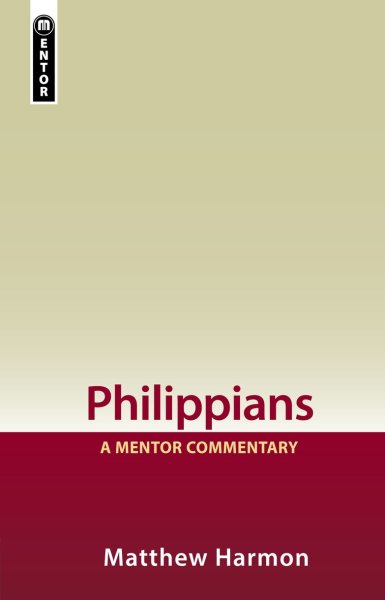
Mentor Commentary: Philippians (MNT)
Reviews
Matthew Harmon's commentary on Philippians is an outstanding work. We find careful exegesis and a clear explanation of the text. The commentary is theologically rich, in terms of both biblical and systematic theology, and so there is more than a running commentary. Harmon also applies the text to readers in practical ways. Scholars, students, pastors, and teachers will profit significantly from this work. — Thomas R. Schreiner, James Buchanan Harrison Professor of New Testament Interpretation and Associate Dean, The Southern Baptist Theological Seminary, Louisville, Kentucky... Harmon has struck an extremely helpful balance with this commentary on Philippians. While neither becoming lost in scholarly cul-de-sacs nor avoiding tough questions, Harmon focuses on the text of Paul's letter and its application. His commentary is a sensitive and thoughtful guide to Philippians that will be appreciated by pastors, scholars, students, and (perhaps especially) by those who are some combination of the three. One particular strength of the commentary is Harmon's clear and thoughtful analysis of Paul's use of the OT in Philippians. Philippians has too often been neglected in studies of the use of the OT in the NT, but Harmon brings the sophistication and sensitivity that mark his previous work on the OT in Galatians to this commentary, while avoiding unnecessary technicality. — Journal of the Evangelical Theological Society
Historically aware, exegetically astute, and theologically sensitive... A new go-to resource for pastors and students! — Lee Gatiss, Director of Church Society, and Adjunct Lecturer in Church History, Union School of Theology, Bridgend, Wales
... a model of good commentary writing...I commend his work to students, teachers, and preachers who seek better to understand this important letter of Paul. — Douglas Moo, Wessner Chair of Biblical Studies, Wheaton College, Wheaton, Illinois
Dr. Matthew Harmon serves as Professor of New Testament Studies at Grace College and Theological Seminary in Winona Lake, Indiana. He also serves on the preaching team of Christ's Covenant Church.
Mentor Commentary: Proverbs (MOT)

Mentor Commentary: Proverbs (MOT)
We have lost something priceless, and seem to be trying to replace it with more and more 'information'. We need wisdom! Communications technology leaves us no rest to work things out; mostly we just react, and worry, and fail - and react again. We make business decisions, ethical decisions, and relationship decisions against a continuously moving landscape that doesn't allow them to be satisfying... consistent... dependable.
To cope we must have wisdom! There is no better starting point than the Book of Proverbs. Its purpose is to impart wisdom to those who want it. From its pages God promises to set us on 'The path of life' (Prov. 15:24).
After years of painstaking study, John Kitchen has produced a work that is authoritative, comprehensive and insightful. He examines the chronology, authorship, composition, structure and context of Proverbs and does the hard work of providing cross-references alerting the reader to rich veins running beneath the surface of Proverbs and other Biblical books.
You want wisdom to help run your life? Think you are running out of time? Then this is a priceless, timeless book that will reward your investment as you seek to gain wisdom rather than knowledge.
Reviews
"Dr. John Kitchen's commentary represents a good combination of scholarly research and practical godly admonition. It provides both the experienced biblical scholar and the beginning Bible student a very helpful resource for the study of Proverbs." — Gennady Pshenichny, Lecturer in the Old Testament, Former President, Kuban Evangelical Christian University, Krasnodar, Russia"Up to now my best helps on Proverbs have been Bridges, Alden and Ross. Now I must add John Kitchen's choice and compendious study in the Mentor Commentary Series. He is clear and probing on the text and always practical. His Appendix on wisdom vs folly is powerful and his Thematic Index of Proverbs opens up the only real preaching possibility for expositors beyond chapter nine of the book. Strings of pearls cannot be taught or preached verse by verse. This is a solid and substantial piece of work, which will deservedly take its place as one of the finest contemporary treatments available." — David L. Larsen, Professor Emeritus of Preaching, Trinity Evangelical Divinity School, Deerfield, Illinois
"Committed to the full integrity and authority of the Bible as the written Word of God, to careful exegesis of the text, and to practical application of the truths of biblical wisdom to everyday life." — Eugene H. Merrill, Distinguished Professor of Old Testament Studies, Dallas Theological Seminary, Dallas, Texas
John Kitchen is the Senior Pastor at the Stow Alliance Fellowship, Stow, Ohio
Mentor Commentary: Psalms 1-72 (MOT)
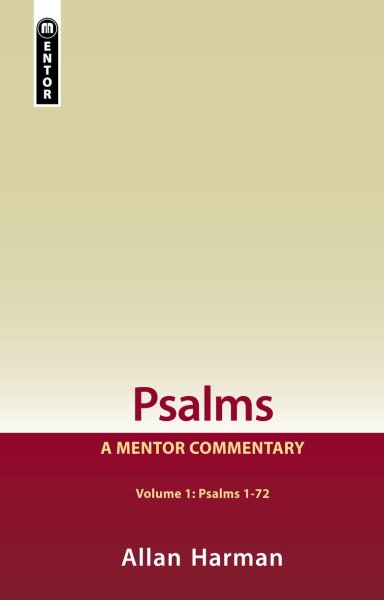
Mentor Commentary: Psalms 1-72 (MOT)
Mentor Commentaries retains a high view of Scripture while interacting with other research from different theological viewpoints.
Reviews
"Allan Harman's commentary is the fruit of a lifetime's study of the Psalter and provides a well-informed, reliable guide to the vast literature on the subject. The extensive introduction is itself worth its weight in gold while the Scripture text is opened up in a clear, careful and devout way." — Philip H. Eveson, former principal of London Theological Seminary and lecturer in Old Testament exegesis, theology and preaching"This commentary will be a worthy resource for the pastor and student in the study as well as the layman seeking personal edification." — Michael Lefebvre, Pastor Christ Church Reformed Presbyterian Church, Indianapolis, Indiana
"The focus is on the original meaning of the psalms with clear explanations of the message of each psalm through an analsysis of structure, key words, and the flow of the psalm. And yet, the meaning of the psalms for God's people today is also emphasized by showing important connections to the New Testament. The reader will discover the rich treasures in the Psalms through the use of this commentary." — Richard P. Belcher, Jr., John D. and Frances M. Gwin Professor of Old Testament and Academic Dean, Reformed Theological Seminary, Charlotte, North Carolina
Allan Harman has had a life-time interest in exposition of the biblical text. He is Research Professor at the Presbyterian Theological College in Melbourne, Australia. He has lectured and preached in many countries and served as the senior editor of the Reformed Theological Review, Australia's oldest theological journal until he retired at the end of 2013.
Mentor Commentary: Psalms 73-150 (MOT)
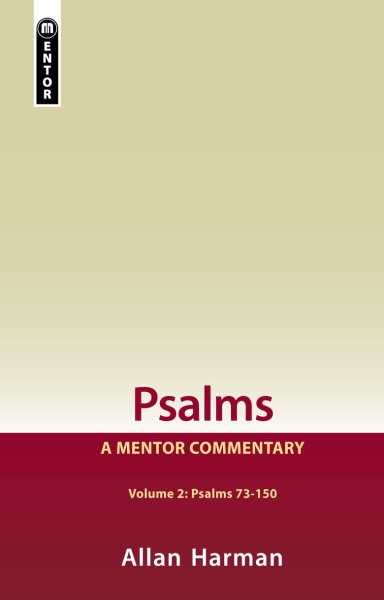
Mentor Commentary: Psalms 73-150 (MOT)
Reviews
"This commentary will be a worthy resource for the pastor and student in the study as well as the layman seeking personal edification." — Michael Lefebvre, Pastor, Christ Church Reformed Presbyterian Church, Indianapolis, Indiana"The focus is on the original meaning of the psalms with clear explanations of the message of each psalm through an analsysis of structure, key words, and the flow of the psalm. And yet, the meaning of the psalms for God's people today is also emphasized by showing important connections to the New Testament. The reader will discover the rich treasures in the Psalms through the use of this commentary." — Richard P. Belcher, Jr., John D. and Frances M. Gwin Professor of Old Testament and Academic Dean, Reformed Theological Seminary, Charlotte, North Carolina
"Allan Harman's commentary is the fruit of a lifetime's study of the Psalter and provides a well-informed, reliable guide to the vast literature on the subject. The extensive introduction is itself worth its weight in gold while the Scripture text is opened up in a clear, careful and devout way." — Philip H. Eveson, former principal of London Theological Seminary and lecturer in Old Testament exegesis, theology and preaching
Allan Harman has had a life-time interest in exposition of the biblical text. He is Research Professor at the Presbyterian Theological College in Melbourne, Australia. He has lectured and preached in many countries and served as the senior editor of the Reformed Theological Review, Australia's oldest theological journal until he retired at the end of 2013.
Mentor Expository Commentary: 1, 2, 3 John
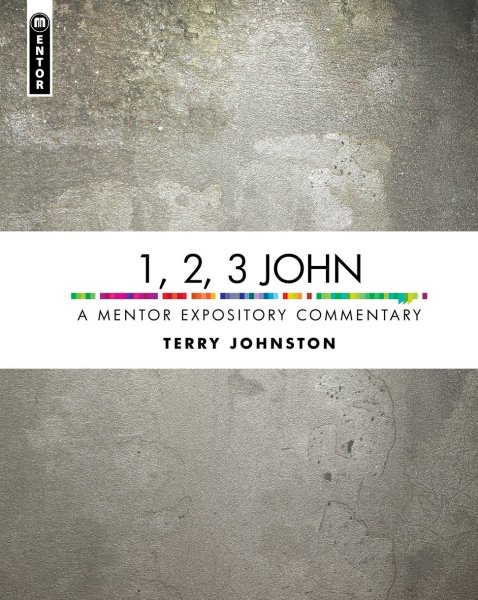
Mentor Expository Commentary: 1, 2, 3 John
Terry L. Johnson takes a Christ-centred approach to the exposition of 1-3 John, the personal, pastoral, and passionate pleas from the apostle John for the church to remain united and strong in the face of persecution.
The Mentor Expository Series holds to an inerrant view of Scripture. This is a resource for pastors and Bible teachers who want to draw on Christ-centered expository teaching and for the lay reader who wants to delve more deeply into the riches of the Word of God.
With so many commentaries on the market today, anyone entering this field with a new publication must add something a little special. In this commentary on the three letters of John, Terry Johnson does just that. It is succinct, straightforward, relevant, encouraging and theological.
Endorsements
"Dr Johnson's expositions help bring John's message home to us. His commentary has several evident strengths. The words of John are not only explained, but illustrated and applied. The structure of each chapter is clear and the style accessible. The book is also enriched by quotations from other expositors." - David Campbell, Evangelical Times
"With so many commentaries on the market today, anyone entering this field with a new publication must add something a little special. In this commentary on the three letters of John, Terry Johnson does just that. It is succinct, straightforward, relevant, encouraging and theological." - Brian H. Edwards, Evangelicals Now
"Terry L. Johnson is a sober-minded careful expositor of the Word of God, but he is no dry academician. He carefully examines each passage in its context and seeks to understand both its meaning and its application to life." - Roland S. Barnes, Senior Pastor,Trinity Presbyterian Church, Statesboro, Georgia
"... Terry Johnson's work on these Epistles to be one of the very best and most accurate expositions of the meaning of these letters. I wish I had had this volume when I last preached through I John some five years ago!" - Douglas F. Kelly, Professor of Theology Emeritus, Reformed Theological Seminary, Charlotte, North Carolina
"Terry Johnson loves the Bible. He also loves speaking directly, fearlessly and with great clarity. This excellent commentary on the Epistles of John demonstrates this." - Tom Cannon, National Coordinator, Reformed University Fellowship, Lawrenceville, Georgia
Terry Johnson is the senior minister of the Independent Presbyterian Church in Savannah, Georgia.
Mentor Expository Commentary: Ephesians
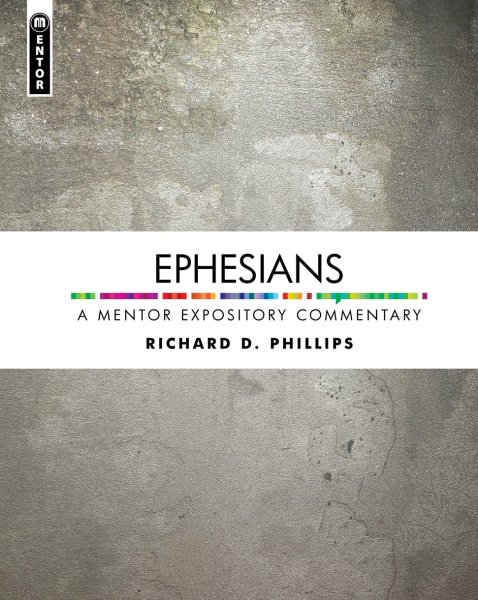
Mentor Expository Commentary: Ephesians
What makes Ephesians so beloved and valuable is not its genius or complexity but its clear and thorough teaching of the doctrines of salvation, of the church, and of the Christian life. Richard D. Phillips sets out in 65 wonderful expositions the beauty of Ephesians.
Mentor Expository Series holds to an inerrant view of Scripture. This is a resource for pastors and Bible teachers who want to draw on Christ-centered expository teaching and for the lay reader who wants to delve more deeply into the riches of the Word of God.
Endorsements
"A rich and insightful commentary on Paul's most theologically comprehensive letter ... Easily rises to the top of recommendable books on Ephesians." - Derek Thomas, Senior Minister of Preaching and Teaching, First Presbyterian Church, Columbia, South Carolina
"By guiding readers through the wide range of issues covered in Ephesians, Richard Phillips has provided us with a mini-course in theology ... Here is a worthy resource to help readers mine the depths of God's Word in readable and practical fashion." - Brandon D. Crowe, Associate Professor of New Testament, Westminster Theological Seminary, Philadelphia, Pennsylvania
"... may we be grateful that Richard D. Phillips, a seasoned and skilled preacher of the Word of God, has gifted the church with this expository commentary on this precious letter. Phillips' Ephesians will help you to see in new ways the riches and the depths of the gospel of Jesus Christ." - Guy Prentiss Waters, James M. Baird, Jr. Professor of New Testament, Reformed Theological Seminary, Jackson, Mississippi
"A rich and insightful commentary on Paul's most theologically comprehensive letter ... Easily rises to the top of recommendable books on Ephesians." - Derek Thomas, Senior Minister of Preaching and Teaching, First Presbyterian Church, Columbia, South Carolina
"By guiding readers through the wide range of issues covered in Ephesians, Richard Phillips has provided us with a mini-course in theology ... Here is a worthy resource to help readers mine the depths of God's Word in readable and practical fashion." - Brandon D. Crowe, Associate Professor of New Testament, Westminster Theological Seminary, Philadelphia, Pennsylvania
Richard D. Phillips is Senior Minister at Second Presbyterian Church in Greenville, South Carolina.
Mentor Expository Commentary: Galatians
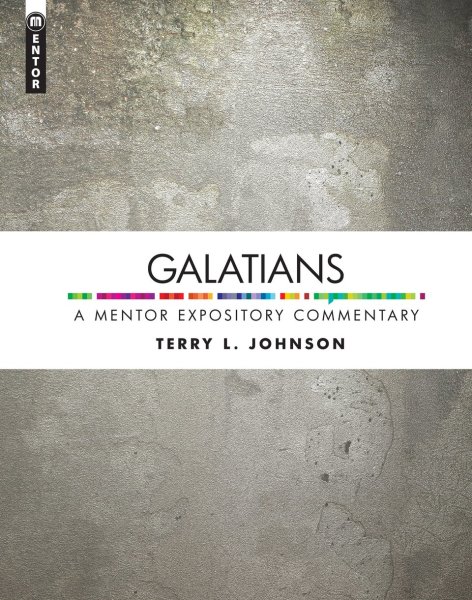
Mentor Expository Commentary: Galatians
"What must I do to be saved?"
This is the message that the book of Galatians seeks to answers. It tells us that there is a gospel message to preach even 2000 years on from when these words were first penned. It presents for us the truth of the gospel, unearthing the central message that righteousness can only be obtained through justification by faith. We are told in no uncertain terms that we cannot have this on our own merit.
It considers the original context that there would have been questions as to what of the Jewish custom should be adopted if any as Gentiles joined the church. There were issues that could divide them but above all they needed to preach the gospel and to live lives that were bearing the fruit of God's word in them.
Terry L. Johnson skilfully exposits 22 chapters which look at the theological aspect of Galatians then 18 chapters looking at the practical outworking of the letter. It contains a wealth of material for helping us to live Christian lives; to walk by the Spirit.
The Mentor Expository Series holds to an inerrant view of Scripture. They are thoroughly researched with helpful practical application. This is a resource for pastors and Bible teachers who want to draw on Christ-centered expository teaching and for the lay reader who wants to delve more deeply into the riches of the Word of God.
Endorsements
"Clear exposition, forceful exhortation, and brazen applications are the hallmarks of Terry Johnson's preaching. Pastor Johnson doesn't tell us about Galatians; he speaks God's Word to our hearts from Galatians." - Peter Kemeny, Pastor, Good News Presbyterian Church, Frederick, Maryland
"Remarkably fresh, insightful and faithful to the gospel." - Richard D. Phillips, Senior Minister, Second Presbyterian Church, Greenville, South Carolina
"Johnson's commentary is essential reading for preachers and lay folk alike." - Derek Thomas, Senior Minister of Preaching and Teaching, First Presbyterian Church, Columbia, South Carolina
"Dr. Johnson's extensive pastoral work, his insights into the word of God, his demonstrated leadership in teaching and living the message of the book of Galatians qualifies him as the man for the hour to write this great new commentary." - Michael A. Milton, President and Senior Fellow at D. James Kennedy Institute for Christianity and Culture
"... a fine commentary and an excellent resource for teachers and pastors." - New Horizons Magazine
"Johnson clearly explains some of the most difficult passages in Scripture, stalwartly defends evangelical doctrines such "justification by faith alone," - Greg Gilbert, Senior Pastor, Third Avenue Baptist Church, Louisville, Kentucky, Author of What is the Gospel?
Terry Johnson is the senior minister of the Independent Presbyterian Church in Savannah, Georgia.
Mentor Expository Commentary: Revelation
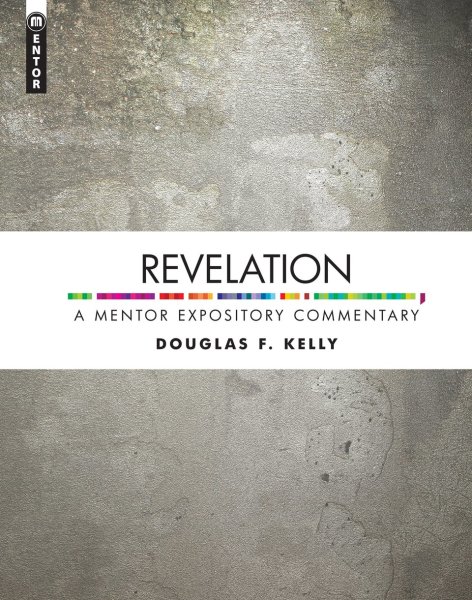
Mentor Expository Commentary: Revelation
There is so much in the past, present and future that we do not understand. The book of Revelation helps us understand who is in full and sovereign control, the victorious Lamb on his throne. And what a great unveiling of the glorious Saviour is revealed in this apocalyptic book! In 65 expositional chapters, Douglas Kelly draws our attention to the central theme of this profound book – the Lord Jesus Christ himself.
The Mentor Expository Series holds to an inerrant view of Scripture. The series is thoroughly researched with helpful practical application. This is a resource for pastors and Bible teachers who want to draw on Christ–centered expository teaching and for the lay reader who wants to delve more deeply into the riches of the Word of God.
Endorsements
"Written from a semi-preterist point of view, Dr. Kelly provides both theological and pastoral insights of great consequence to John's apocalyptic vision that often puzzles its readers. Highly recommended." - Derek Thomas, Senior Minister of Preaching and Teaching, First Presbyterian Church, Columbia, South Carolina
"The church, including the Western church and the global South, need to read the book of Revelation now more than ever. Let Douglas Kelly be your guide. I commend the book and I commend the publisher for such a time as this." - Michael A. Milton, President and Senior Fellow at D. James Kennedy Institute for Christianity and Culture
"The beauty, fragrance, majesty, grace and omnipotent power of 'the Lamb of God, slain before the foundation of the world' has at times all but overwhelmed me! Revelation is primarily about Jesus Christ; He is the hero of all ages. Satan, though real enough, is finally a minor note in this divinely orchestrated symphony. My zeal has never been so much for any millennial theory, as it is for HIM, and going through this Apocalypse has only increased that zeal." - Douglas F. Kelly, Professor of Theology Emeritus, Reformed Theological Seminary, Charlotte, North Carolina
"What a great blessing it is for the church to regain clarity about the message of Revelation! Kelly's commentary will prove invaluable in restoring this vital message to the pulpits of our churches and the lives of suffering believers." - Richard D. Phillips, Senior Minister, Second Presbyterian Church, Greenville, South Carolina
- Douglas F. Kelly is the Professor of Theology Emeritus at Reformed Theological Seminary, Charlotte, North Carolina.Douglas F. Kelly is the Professor of Theology Emeritus at Reformed Theological Seminary, Charlotte, North Carolina.
Minor Prophets - Hosea through Malachi: Cornerstone Biblical Commentary

Minor Prophets - Hosea through Malachi: Cornerstone Biblical Commentary
The Cornerstone Biblical Commentary series provides up-to-date, evangelical scholarship on the Old and New Testaments. Each volume is designed to equip pastors and Christian leaders with exegetical and theological knowledge to better understand and apply God’s Word by presenting the message of each passage as well as an overview of other issues surrounding the text. The commentary series has been structured to help readers get at the meaning of Scripture, passage-by-passage, through the entire Bible.
The New Living Translation is an authoritative Bible translation, rendered faithfully into today’s English from the ancient texts by 90 leading Bible scholars. The NLT’s scholarship and clarity breathe life into even the most difficult-to-understand Bible passages—but even more powerful are stories of how people's lives are changing as the words speak directly to their hearts. That's why we call it “The Truth Made Clear.”
Nehemiah: Bible Speaks Today (BST)
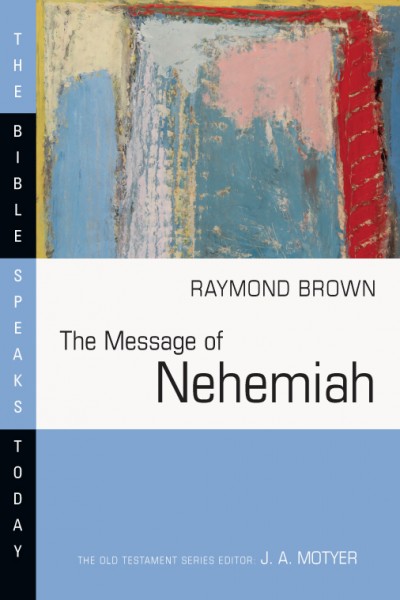
Nehemiah: Bible Speaks Today (BST)
The book of Nehemiah is about starting over again. Nehemiah, one of Israel's great leaders, tells firsthand the powerful story of the rebuilding of ancient Jerusalem's walls after the exile. This rebuilding, in the face of great odds, represented the people's renewal of faith, their overcoming of national shame and the reforming of their conduct.
In sizing up Nehemiah the man, Raymond Brown surmises: "He must surely be regarded as one of the most inventive and resilient personalities in the rich tapestry of Old Testament biography."
Brown vividly sketches Nehemiah's historical and social setting and demonstrates the striking relevance for today of his dominant themes: Nehemiah's doctrine of God, his passion for Scripture, his experience of prayer and his example of leadership.
About the Bible Speaks Today (BST) Series:
Edited by J.A. Motyer and the late John R. W. Stott, the Bible Speaks Today commentaries are characterized by what Stott called a "threefold ideal . . . to expound the biblical text with accuracy, to relate it to contemporary life and to be readable." As such, each contributor in this series is both a noted scholar and a working pastor.
The BST series, now complete, covers all sixty-six books of the bible (Old and New Testaments) in fifty-five volumes. If you preach or teach from Scripture, the Bible Speaks Today series will help you apply the timeless biblical message to the everyday experiences of your listeners. And if you study the Bible on your own, these volumes will be a helpful resource focusing on the significance of God's Word for your own life and work.
New Covenant Commentary Series: 1 Corinthians
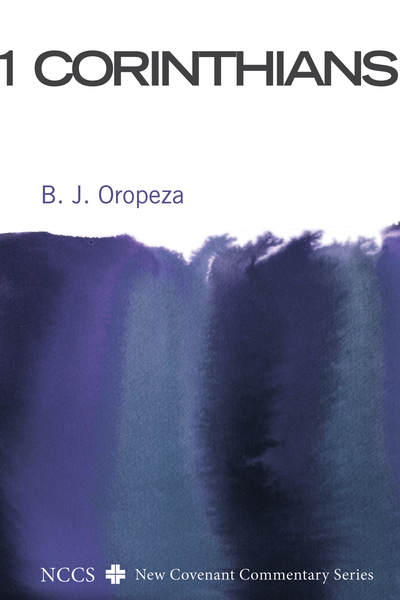
New Covenant Commentary Series: 1 Corinthians
This compact commentary on 1 Corinthians is both readable and full of insights that will engage students, ministers, and scholars alike. The Apostle Paul writes to a relatively new church in which members are failing to maintain solidarity with other members. They struggle to find their unique place in Roman society as Gentile followers of Jewish leaders that proclaim Christ as Lord. Their many problems include competition over leadership and social prestige, sexual impropriety, household conflicts, idol foods, table fellowship, protocols on gender and the use of spiritual gifts, and confusion about death, immortality, and Christ's return.
Oropeza addresses Paul's response to these and other issues as he engages ancient biblical, Jewish, and Greco-Roman sources along with recent scholarship. This is a must-read for those who want to understand the Corinthian situation and Paul's response in a new way.
Praise
“This commentary deeply embeds Paul in Jewish, Greek, and Roman moral, political, mythical, and religious beliefs and practices in the ancient Mediterranean world. The challenge for the reader is how to translate, transfer, or reconfigure these beliefs and practices into a Christian lifestyle in a highly different but related world during the twenty-first Century.” — Vernon K. Robbins, Emory University
B. J. Oropeza is Professor of Biblical and Religious Studies at Azusa Pacific University (Azusa, CA). Among his numerous publications are Exploring Second Corinthians (2016) and Exploring Intertextuality (2016, co-editor Steve Moyise)
New Covenant Commentary Series: 1 Timothy
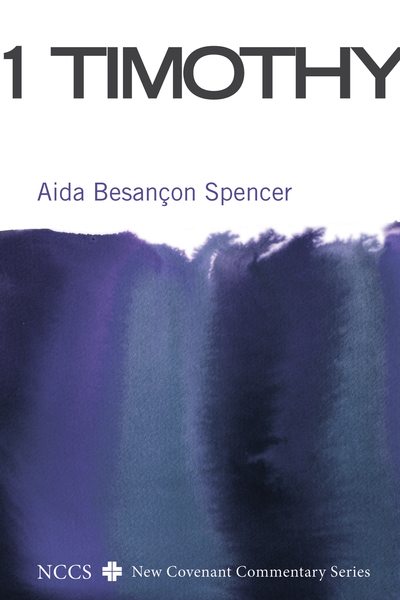
New Covenant Commentary Series: 1 Timothy
A thorough and insightful commentary on Paul's letter to his coworker Timothy, which the Apostle wrote before and during Nero's persecution. Spencer carefully examines each part of the letter and relates it to the overall flow of the argument and in light of the larger biblical, historical, social, and cultural contexts. How Paul's writing related to the ancient communities is highlighted in the light of original data gleaned from her explorations on location in Ephesus and throughout Greece. In addition, Paul's rhetorical and ministry strategies, especially as they relate to women and their role in the church, are explored. Throughout, Spencer presents an in-depth exegesis in a readable format enhanced by forty years of ministry.
Praise
"By explaining both lexical, grammatical, historical, and theological matters, and by focusing consistently on canonical connections and pastoral application, Aida Spencer has written a lucid commentary that will prove helpful for general readers, students, and pastors alike." --Eckhard J. Schnabel, Associate Editor, Bulletin of Biblical Research
"In 1 Timothy, more than any other New Testament writing, Paul has specific instructions for how Christian women are to present and conduct themselves, and how they are to learn, teach, and minister in the church. How appropriate [it is], then, that a commentary on this book should be written by a woman. Dr. Spencer provides a carefully researched, well-balanced, and well-written exposition with special attention given to the difficult and controversial texts relating to women, men, and to all Christians. Highly recommended." --John R. Kohlenberger III, Editor, The NIV Greek and English New Testament
"Spencer well understands that our texts are in dialogue with their contexts and that the wise interpreter must mark out the intimate relationships between scripture and its worlds, both ancient and modern. 1 Timothy is a careful and confessional exploration of Paul's message for the young pastor in Ephesus and the leader in today's church. Both readable and detailed, this is a work that wise expositors will keep within easy reach." --Gene L. Green, Professor of New Testament, Wheaton College and Graduate School
"As a believer with the simple faith of a child, the author manages to provide a well-researched and easily readable scholarly contribution on 1 Timothy. It is refreshing to read this well-balanced contribution by a female scholar on this letter that repeatedly refers to the role of woman in the church but also to other ministerial strategies. Her perspectives on the influence of this text on a contemporary faith community are enlightening." --Francois P. Viljoen, Professor, Faculty of Theology, North-West University
"Spencer's commentary on 1 Timothy provides an articulate defense of Pauline authorship that interacts well with critical scholarship. It is full of valuable grammatical, lexical, syntactical, historical, and theological insights...Theological insights include its discussion of the heretical teaching addressed in 1 Timothy and its outstanding treatment of 1 Timothy 2:15. I enthusiastically endorse this well-documented commentary." --Philip B. Payne, Author of Man and Woman, One in Christ
Aida Besancon Spencer (PhD, Southern Baptist Theological Seminary, Louisville, KY; ThM, MDiv, Princeton Theological Seminary) is Professor of New Testament at Gordon-Conwell Theological Seminary, South Hamilton, MA, and Extraordinary Researcher for North-West University, Potchefstroom, South Africa. She is the author or coauthor of thirteen books, including 2 Corinthians (Bible Study Commentary), Beyond the Curse: Women Called to Ministry, and Paul's Literary Style.
New Covenant Commentary Series: 1-2 Thessalonians
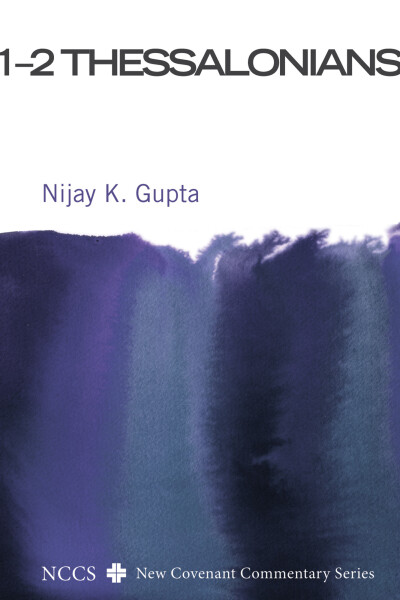
New Covenant Commentary Series: 1-2 Thessalonians
In the first century, the Thessalonian Church grieved deaths in their community, endured harsh persecution, and struggled with questions about the future. Paul offered them the comforts and reassurances of hope in the Messiah Jesus. But he offered far more than wishful thinking or pie-in-the-sky comfort.
Paul’s emphasis on hope in the Messiah Jesus involved capturing a vision of God’s redeemed and just future in order to see and live faithfully today. Paul did not believe in a passive hope, but an active hope where, if the Day of the Messiah is a beacon, believers set their course and diligently move towards it. That diligence is especially captured by love for Christian brothers and sisters, commitment to honest and productive work, and obedience to the truth of the gospel of Lord Messiah Jesus.
Praise
"In conversation with the best interpreters of the Thessalonian letters across the centuries, Nijay Gupta offers us a rich feast of insights into these very early Christian Scriptures. Simultaneously accessible and perceptive, attentive to historical context as well as contemporary theological and spiritual concerns, this is a commentary for students, pastors, and all readers of Paul." - Michael J. Gorman, Raymond E. Brown Professor of Biblical Studies and Theology, St. Mary's Seminary & University
"Nijay Gupta's commentary on 1 and 2 Thessalonians demonstrates reliable, even-handed scholarship, theological and pastoral sensitivity, and a masterful ability to lay out the letters' substance and basic flow of thought in an engaging style that is a pleasure to read. These qualities, along with its manageable size, make it ideal for use in the classroom and for local church pastors and teachers. Highly recommended!" - Andy Johnson, Professor of New Testament, Nazarene Theological Seminary
"Here is a commentary that does not miss the mark. It is exegetically sound, theologically astute, and ecclesially centered. Gupta seems to delight in showing how these ancient texts make modern sense. I read few commentaries cover to cover, but Gupta's I did. It is well worth the time and investment, for he carefully weighs the interpretive options and arrives at well-reasoned and well-supported readings. I want this one on my shelf." - David B. Capes, Academic Dean and Professor of New Testament, Houston Graduate School of Theology
"Nijay K. Gupta is a gifted interpreter of Scripture. Herein, you will find incisive, insightful commentary on the Apostle Paul's earliest extant letters. I warmly commend this comparatively (and refreshingly!) compact treatment of the Thessalonian correspondence, not least the exegetical skill, theological engagement, and pastoral concern manifestly evident throughout." - Todd D. Still, DeLancey Dean and Hinson Professor, Baylor University, Truett Seminary
Nijay K. Gupta is Assistant Professor of New Testament at George Fox Evangelical Seminary, Portland, OR. His recent books include a commentary on Colossians and Prepare, Succeed, Advance: Getting a PhD in Biblical Studies and Beyond (Wipf & Stock).
New Covenant Commentary Series: 2 Timothy and Titus

New Covenant Commentary Series: 2 Timothy and Titus
A thorough and insightful commentary on Paul's letter to his coworker Timothy, which the apostle wrote before and during Nero's persecution. Spencer carefully examines each part of the letter and relates it to the overall flow of the argument and in light of the larger biblical, historical, social, and cultural contexts. How Paul's writing related to the ancient communities is highlighted in the light of original data gleaned from her explorations on location in Crete, Ephesus, and Rome. In addition, Paul's rhetorical and ministry strategies, especially as they relate to women and their role in the church, are explored. Throughout, Spencer presents an in-depth exegesis in a readable format enhanced by forty years of ministry.
Praise
"By explaining lexical, grammatical, historical, and theological matters, and by focusing consistently on canonical connections and pastoral application, Aida Spencer has written a lucid commentary that will prove helpful for general readers, students, and pastors alike." --Eckhard J. Schnabel, associate editor of Bulletin of Biblical Research
"This volume completes Spencer's valuable commentary on the Pastoral Epistles. Concise and readable, it also provides in-depth analysis of the flow of each letter, and serious word studies sensitive to both biblical and Greco-Roman usage...This volume is especially sensitive to the gender-oriented instructions concerning leadership and conduct in Titus and 2 Timothy. Highly recommended." --John R. Kohlenberger III, editor of The NIV Greek and English New Testament
"Aida Spencer's rich exposition of Paul's last letters is a welcome companion to her work on the first of the Pastoral letters, 1 Timothy. The commentary beguiles as it combines brevity and economy of expression with rich and deep insight into the meaning of Paul's message to the pastors he sent to Crete and Ephesus. As always, Spencer carefully attends to the world of the author and his recipients, framing his message within the cultural matrix of the Greco-Roman world. At the same time, she helps pastor, teacher, and student bridge the gap between the message then and now. Listen and relish as you hear the timbre of the apostolic voice afresh and anew." --Gene L. Green, author of The Letters to the Thessalonians
Aida Besancon Spencer is Professor of New Testament at Gordon-Conwell Theological Seminary and Extraordinary Lecturer of North-West University. Besides teaching, Dr. Spencer has worked as a Spanish community organizer and Presbyterian minister. She was born and reared in Santo Domingo, Dominican Republic. She is the author of twelve books and hundreds of articles including 2 Corinthians: Daily Bible Commentary and Paul's Literary Style: A Stylistic Comparison of II Corinthians 11:16-12:13, Romans 8:9-39, and Philippians 3:2-4:13.






- Adapt your commentary collection month-to-month based on the book or books you are studying.
- Build your commentary library strategically without hundreds of dollars of upfront investment.
- Never get stuck with commentaries you rarely use - swap them out each month as your needs change.



